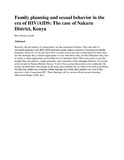| dc.contributor.author | Ben, Obonyo Jarabi | |
| dc.date.accessioned | 2013-05-30T06:38:38Z | |
| dc.date.available | 2013-05-30T06:38:38Z | |
| dc.date.issued | 2000-03 | |
| dc.identifier.citation | Studies in Family Planning, 2000 Volume 31, Issue 1, pages 69–80, | en |
| dc.identifier.uri | http://erepository.uonbi.ac.ke:8080/xmlui/handle/123456789/27305 | |
| dc.description.abstract | Recently, the prevalence of contraceptive use has increased in Kenya. The twin risks of unwanted pregnancy and HIV/AIDS infection remain central concerns of reproductive health programs. However, we do not know how sexually active men and women perceive these risks, nor the strategies they consider appropriate to cope with these risks, nor the difficulties they face in trying to adopt appropriate sexual behaviors to minimize them. This study seeks to provide insights into perceptions, coping strategies, and constraints in the changing behavior of sexually active people in Nakuru District, Kenya. Twelve focus-group discussions were conducted, the results of which show that people in the study area consider the two risks to be serious problems, but that they neither use condoms within marriage nor refuse their partners sex even if they perceive a risk of acquiring HIV. These findings call for serious efforts toward fostering behavioral change in this area. | en |
| dc.language.iso | en | en |
| dc.publisher | University of Nairobi | en |
| dc.title | Family planning and sexual behavior in the era of HIV/AIDS: The case of Nakuru District, Kenya | en |
| dc.type | Article | en |
| local.publisher | Population Studies and Research Institute | en |

